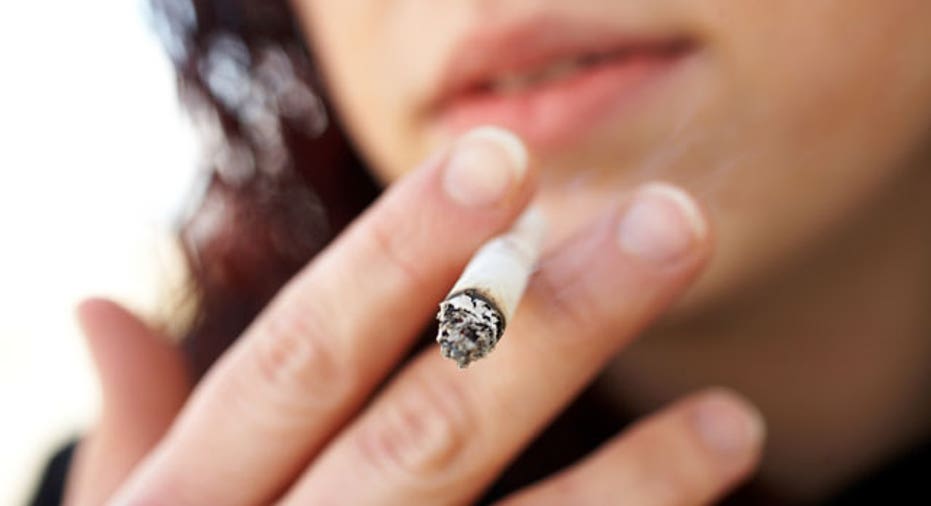ObamaCare Penalty Kicks Smokers in the Ash

Smokers could face sticker shock when shopping for individual or small-group health insurance in the new state health marketplaces scheduled to open this fall, due to a controversial clause in the Affordable Care Act, or ACA, that allows insurers to penalize smokers by continuing to charge higher rates to tobacco users.
President Barack Obama's landmark health insurance reform legislation ends decades of advantageous underwriting practices by barring insurers from, among other things, limiting lifetime benefits and denying coverage due to pre-existing conditions.
But the law widely known as Obamacare also aims to discourage tobacco use, the nation's largest preventable health hazard, which kills some 443,000 Americans each year at an annual cost to the nation of $193 billion in medical care and lost productivity, according to the Centers for Disease Control and Prevention.
How do you combat tobacco use without discriminating against smokers? The ACA attempts this balancing act by allowing insurers to continue their practice of charging tobacco users a so-called "smoker surcharge" but limiting it to 50% above the rates they charge nontobacco users, beginning in 2014.
Groups question smoker surcharge
"Smoking and tobacco use are the only pre-existing conditions that the Affordable Care Act still allows insurers to discriminate against," says Erika Sward, assistant vice president of national advocacy at the American Lung Association.
Combine the smoker surcharge with another health reform rule that prohibits low-income applicants from using federal tax subsidies to offset the surcharge, and consumer advocates fear older smokers could be priced out of the market.
"While not all health plans charge higher premiums for smokers, we are concerned that, if they do, people who may really need access to health care could be left uninsured because they can't afford coverage," says Gerry Smolka, senior strategic policy adviser for the AARP Public Policy Institute.
The American Lung Association also opposes penalizing smokers for a different reason. "There is absolutely no evidence that surcharges are effective in encouraging smokers to quit," explains Sward.
Critics say surcharge hits the poor
According to the nonprofit Kaiser Family Foundation, the smoker slam would work like this: A 50-year-old, low-income smoker (earning $15,000 for the purposes of this example) would be quoted an annual premium of about $8,100, including a nearly $2,700 tobacco surcharge. The federal low-income subsidy would bring her premium down to about $3,000. But if she didn't smoke, her premium would be just $300. Subsidies can't make the surcharge go away.
Advocates fear she would remain uninsured under this scenario and choose to face the tax penalty in 2014 for failing to carry coverage as required under Obamacare's "individual mandate." The penalty for individuals will be $95 next year, and it will rise to $695 by 2016.
The larger public policy concern is that the surcharge that penalizes smokers could disproportionately put health insurance out of reach for a key group that health reform aims to help: the millions of poor Americans who currently lack coverage.
"There's that sense that any variation in premium constitutes a kind of income discrimination because it is lower-income people and nonwhite people who are most likely to smoke," says Deborah Chollet, a senior fellow at Mathematica Policy Research in Washington, D.C.
Administration says law helps smokers
A representative for the federal Centers for Medicare and Medicaid Services, or CMS, says that, despite the media kerfuffle, Obamacare actually benefits rather than penalizes smokers.
"Before the ACA, insurance companies could charge far more than 50% more for smokers or simply deny them coverage altogether because they smoke. The ACA puts limits on how much more smokers can be charged," says the representative, who spoke under condition of anonymity.
CMS notes that tobacco users can avoid 50% smoker surcharges in two ways: by enrolling in a tobacco-cessation program; or through state-adopted insurance standards that set lower limits on surcharges or prohibit any premium differences between smokers and nonsmokers. As of June, three states have adopted lower limits, and six states plus the District of Columbia have prohibited any price rating based on tobacco use. The latter group includes the nation's most populous state, California.
"The concern in California was that smoking is so linked to poverty and chronic disease that insurers were going to use it basically as a proxy for rating by disease status," says Dylan Roby, an assistant professor of health policy and management at UCLA's Fielding School of Public Health.
Glitch crimps smoker penalty, for now
Some smokers are temporarily getting something of a reprieve from the threat of steep premiums. In June, the Obama administration told insurers that a glitch in health insurance reform would hold down premiums for older smokers.
Chollet says that even when things are working properly, market forces alone will likely keep Obamacare's smoker surcharges well below the 50% cap.
"The average surcharge now is around 15%, and for a simple reason: They don't necessarily want the business to go away," Chollet says. "I don't think we're going to see 50%. States allow that now, and you don't see it happen."
Rick Curtis, president of the Institute for Health Policy Solutions, a nonpartisan research group, agrees that Obamacare is unlikely to penalize smokers too harshly.
"Long story short, smokers generally will not see a rate increase compared to current or previous years' individual insurance premiums," he says. "Individuals who are smokers will ... generally have improved access and more affordable premiums under ACA restrictions."
Copyright 2013, Bankrate Inc.



















